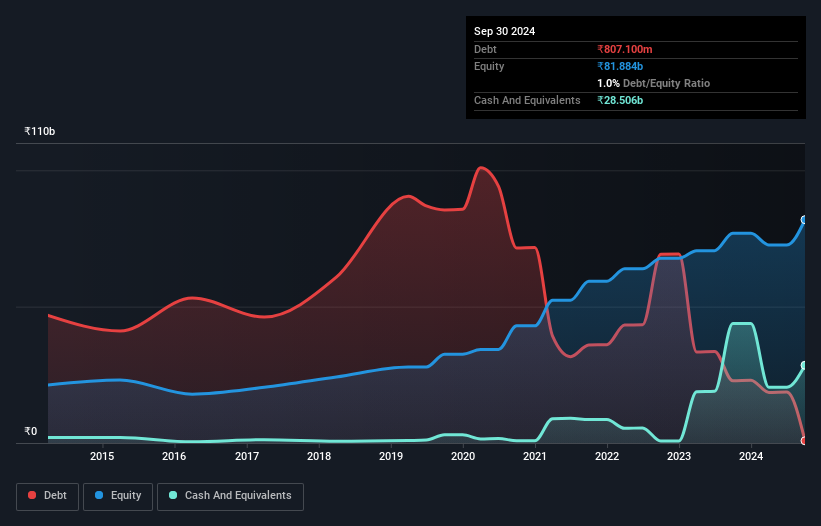Chambal Fertilisers and Chemicals (NSE:CHAMBLFERT) Seems To Use Debt Rather Sparingly

The external fund manager backed by Berkshire Hathaway's Charlie Munger, Li Lu, makes no bones about it when he says 'The biggest investment risk is not the volatility of prices, but whether you will suffer a permanent loss of capital.' So it seems the smart money knows that debt - which is usually involved in bankruptcies - is a very important factor, when you assess how risky a company is. We can see that Chambal Fertilisers and Chemicals Limited (NSE:CHAMBLFERT) does use debt in its business. But is this debt a concern to shareholders?
When Is Debt Dangerous?
Debt is a tool to help businesses grow, but if a business is incapable of paying off its lenders, then it exists at their mercy. Part and parcel of capitalism is the process of 'creative destruction' where failed businesses are mercilessly liquidated by their bankers. However, a more usual (but still expensive) situation is where a company must dilute shareholders at a cheap share price simply to get debt under control. Of course, the upside of debt is that it often represents cheap capital, especially when it replaces dilution in a company with the ability to reinvest at high rates of return. The first thing to do when considering how much debt a business uses is to look at its cash and debt together.
View our latest analysis for Chambal Fertilisers and Chemicals
What Is Chambal Fertilisers and Chemicals's Net Debt?
You can click the graphic below for the historical numbers, but it shows that Chambal Fertilisers and Chemicals had ₹807.1m of debt in September 2024, down from ₹22.8b, one year before. However, its balance sheet shows it holds ₹28.5b in cash, so it actually has ₹27.7b net cash.

A Look At Chambal Fertilisers and Chemicals' Liabilities
According to the last reported balance sheet, Chambal Fertilisers and Chemicals had liabilities of ₹29.1b due within 12 months, and liabilities of ₹14.0b due beyond 12 months. On the other hand, it had cash of ₹28.5b and ₹4.22b worth of receivables due within a year. So its liabilities outweigh the sum of its cash and (near-term) receivables by ₹10.4b.
Since publicly traded Chambal Fertilisers and Chemicals shares are worth a total of ₹201.5b, it seems unlikely that this level of liabilities would be a major threat. Having said that, it's clear that we should continue to monitor its balance sheet, lest it change for the worse. While it does have liabilities worth noting, Chambal Fertilisers and Chemicals also has more cash than debt, so we're pretty confident it can manage its debt safely.
Also good is that Chambal Fertilisers and Chemicals grew its EBIT at 13% over the last year, further increasing its ability to manage debt. When analysing debt levels, the balance sheet is the obvious place to start. But it is future earnings, more than anything, that will determine Chambal Fertilisers and Chemicals's ability to maintain a healthy balance sheet going forward. So if you want to see what the professionals think, you might find this free report on analyst profit forecasts to be interesting.
Finally, while the tax-man may adore accounting profits, lenders only accept cold hard cash. While Chambal Fertilisers and Chemicals has net cash on its balance sheet, it's still worth taking a look at its ability to convert earnings before interest and tax (EBIT) to free cash flow, to help us understand how quickly it is building (or eroding) that cash balance. Happily for any shareholders, Chambal Fertilisers and Chemicals actually produced more free cash flow than EBIT over the last three years. That sort of strong cash generation warms our hearts like a puppy in a bumblebee suit.
Summing Up
We could understand if investors are concerned about Chambal Fertilisers and Chemicals's liabilities, but we can be reassured by the fact it has has net cash of ₹27.7b. And it impressed us with free cash flow of ₹17b, being 136% of its EBIT. So we don't think Chambal Fertilisers and Chemicals's use of debt is risky. The balance sheet is clearly the area to focus on when you are analysing debt. But ultimately, every company can contain risks that exist outside of the balance sheet. For instance, we've identified 1 warning sign for Chambal Fertilisers and Chemicals that you should be aware of.
When all is said and done, sometimes its easier to focus on companies that don't even need debt. Readers can access a list of growth stocks with zero net debt 100% free, right now.
New: AI Stock Screener & Alerts
Our new AI Stock Screener scans the market every day to uncover opportunities.
• Dividend Powerhouses (3%+ Yield)
• Undervalued Small Caps with Insider Buying
• High growth Tech and AI Companies
Or build your own from over 50 metrics.
Have feedback on this article? Concerned about the content? Get in touch with us directly. Alternatively, email editorial-team (at) simplywallst.com.
This article by Simply Wall St is general in nature. We provide commentary based on historical data and analyst forecasts only using an unbiased methodology and our articles are not intended to be financial advice. It does not constitute a recommendation to buy or sell any stock, and does not take account of your objectives, or your financial situation. We aim to bring you long-term focused analysis driven by fundamental data. Note that our analysis may not factor in the latest price-sensitive company announcements or qualitative material. Simply Wall St has no position in any stocks mentioned.
About NSEI:CHAMBLFERT
Chambal Fertilisers and Chemicals
Produces and sells fertilizers primarily in India.
Flawless balance sheet with solid track record and pays a dividend.
Market Insights
Community Narratives




